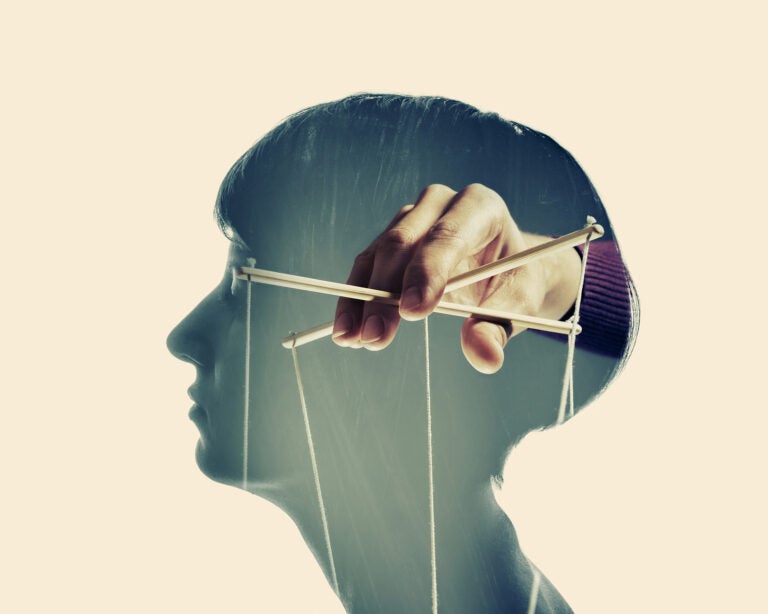The Hidden Forces That Shape Our Behavior
On this episode, we take a look at some of the hidden forces that shape our behaviors and decisions.
Listen 49:49
image of a hand that manipulates the mind of another person isolated and toned
What are the forces that shape our lives? That determine who we are, how we live, and where we end up? It’s easy to think that our lives are mostly the result of decisions we’ve made, from the career we choose, to where we settle down, to who — if anyone — we end up with.
But there are plenty of factors outside our control that influence our lives — other people, larger social trends, and our subconscious behaviors. On this episode, we take a look at some of the hidden forces that shape our behaviors and decisions — in ways that we often leave unexamined.
We hear stories about the chameleon effect, and how mirroring those around us affects the ways we’re perceived – by others and ourselves. We take a deep dive into implicit bias to find out how it shapes our behavior, and whether trainings designed to combat bias actually work. And we examine hierarchies, looking at what form or level of these power structures lead to the most productive behavior.
Also heard on this week’s episode:
- We talk with social scientist Brian Lowery about the profound effects that the people around us have on our identities, behaviors, and decisions. Lowery’s book is called “Selfless: The Social Creation of ‘You’.”
- When Jasmine Jones first started working at Topgolf, she quickly became one of the most popular employees. It took awhile for her to figure out why — because she was constantly mirroring those around her. Pulse producer Nichole Currie talks with Jones about how mirroring affected her social life and sense of self — and why it ultimately pushed her to reexamine her life.
- Reporter Liz Tung talks with researcher Wojciech Kulesza about what exactly mirroring, otherwise known as “the chameleon effect,” is, why we do it, and some of the surprising benefits and drawbacks of mimicking those around us.
- Over the past few years, police killings of Black people have rocketed implicit bias into the national spotlight, leading to countless trainings aimed at combating our subconscious racial biases. But do those trainings actually work? Reporter Alan Yu looks into it.
- Power structures at work can help employees feel empowered, allowing them to do their best work, while feeling supported — but they can also leave people feeling scared, unsure, and totally unmotivated. Reporter Grant Hill talks with researchers about how workplaces can create the right balance to foster the most productive behavior.
WHYY is your source for fact-based, in-depth journalism and information. As a nonprofit organization, we rely on financial support from readers like you. Please give today.






